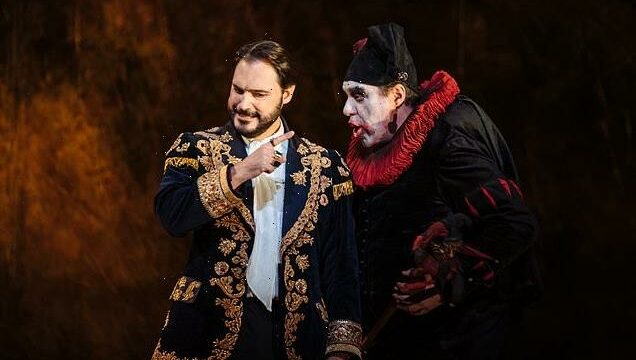It’s worth staying until Act III! Oliver Mears’s Rigoletto at the Royal Opera House features a dramatically credible cast, but the whole thing looks tatty
Rigoletto
Royal Opera House, London Until Saturday
Rating:
Last autumn’s first outing for Oliver Mears’s supposedly new production of Rigoletto was damned with faint praise, not least for the ordinariness of much of the singing.
I didn’t get it. Why would Covent Garden’s new director of opera, in his first new production at the House, draw on a five-year-old effort for a small country house opera?
I suppose when you mark your own homework, you don’t have to bother so much.
Luca Salsi (above, left) is truly excellent as Rigoletto and Francesco Demuro (above, right) as the Duke has a good voice, but it’s too small
In this revival, all the dramatic inadequacies remain. It also doesn’t help that the whole thing looks so tatty. Cheap, and sometimes, like when Monterone gets his eyes put out, also extremely nasty.
Mears’s production is a replacement for the long-running one by David McVicar, which had plenty of vividly depicted orgies which offended some, but also had a dramatic coherence and colour that Mears’s one rarely approaches.
Only in Act III, where cheap spectacle is abandoned by Verdi, and we can focus on the main characters does Mears’s talent for dramatic confrontation really assert itself.
Fortunately the singing in this revival is so much better than first time out. Luca Salsi, pictured far left, as Rigoletto and Rosa Feola as Gilda are truly excellent.
Feola, a protegee of Riccardo Muti, is, at 35, still dramatically credible as Rigoletto’s naive and unworldly daughter. She sings with a touching vulnerability and totally inhabits the role in a way that so many other divas don’t.
Salsi, now in his late 40s, is very much in his vocal prime. It’s good to see a singer bulky enough to be dramatically credible, also singing so movingly during his confrontations with the Duke’s bullies.
Francesco Demuro, as the Duke, pictured left, is yet another of those second-rank tenors in which Covent Garden specialises. It’s not a bad voice, but too small.
The conductor, Tony Pappano, who took the first run, has been replaced by Stefano Montanari. Who? Yes, exactly.
A baroque violinist for most of his career, Montanari has now been let loose on stuff like Rigoletto and there’s no particular evidence he’s really up to it.
Some of his tempi are eccentric, notably the sluggish one for Gilda’s big aria, Caro Nome.
Source: Read Full Article


